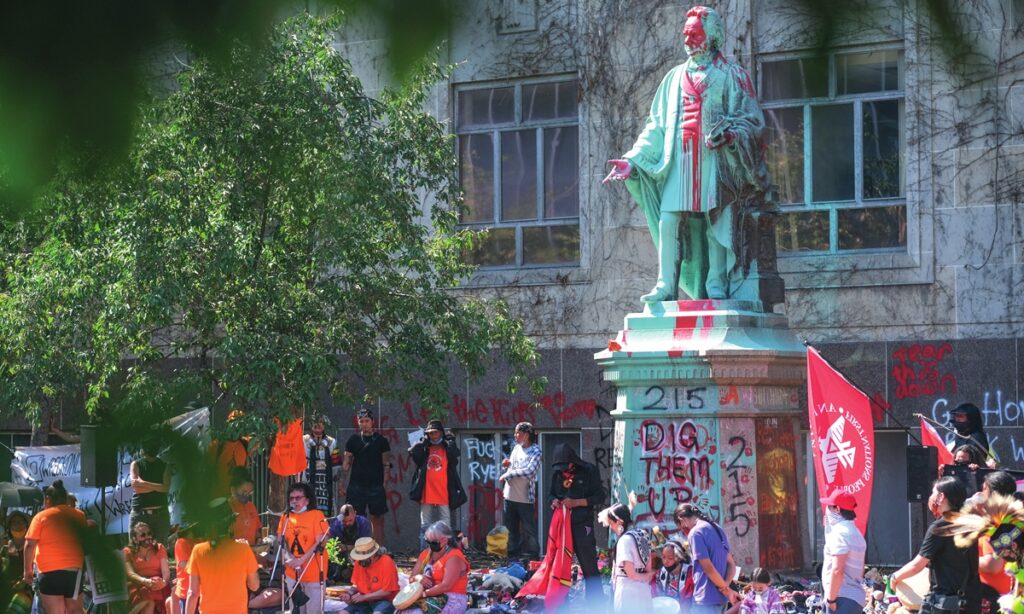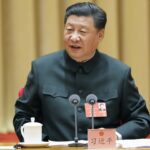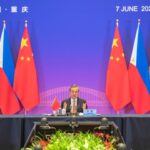From the use of the term “concentration camp” in the first instance to describe the vocational education and training centers in Northwest China’s Xinjiang Uygur Autonomous Region to parse reports rife with loopholes on topics of “forced labor,” “separating ethnic minors from parents,” and “forced sterilization,” the US and the West in general have elaborately woven a malicious narrative in a bid to ramp up a war against China, thoughtlessly bandying about claims of “genocide”- a heinous act entirely foreign to Chinese but altogether too familiar to Anglo-Saxons with a long legacy of genocide and extinction of races.
However hard the West and the US have tried to perfect their “genocide” narrative against China, they cannot find any legal basis in international laws, as genocide is a well-defined term in international laws and treaties. The most respected international tribunals have agreed that proof of the crime of genocide depends on an extremely convincing presentation of factual evidence, which the current “genocide” accusation against China sorely lacks, observers said.
In recent months, more experts and scholars globally have stood up to criticize the US and the West for unfounded genocide accusations against China, pointing out how the misuse of the term for geopolitical agendas is tantamount to a direct insult to the true victims of genocide.
Fabricating lies against China’s Xinjiang
The term genocide was first adopted by the 1948 Convention on the Prevention and Punishment of the Crime of Genocide by the UN and is well-defined in the UN Convention and international laws and treaties. But it loses a lot of its specific meaning when it becomes involved in politics, Graham Perry, a British solicitor and international arbitrator, told the Global Times.
Five acts that are regarded as genocide include the killing of members of a group, causing serious bodily or mental harm, deliberately inflicting conditions of life calculated to bring about the physical destruction in whole or in part of the group, and imposing measures intended to prevent births, which is forced sterilization. The last is forcibly transferring children of one group to a different group.
By reviewing reports on Xinjiang from Western and US media outlets, the Global Times has found that the accusation of “genocide” against Xinjiang did not miraculously appear, but rather followed calculated efforts dating back to 2017 with the goal of fitting said allegations within the parameters defined by the UN Convention.
The first batch of “reports” to use “genocide” in their accusations against China on its Xinjiang policy appeared in January 2018 and has exploded since the beginning of 2020, Li Baiyang discovered, with the help of the GDELT news research tool.
Li is a member of the team conducting “Research on Basic Science Issues of National Security Management Decision-Making Systems” and a postdoctoral fellow at the Information Resources Research Center of Wuhan University.
On January 12, 2018, the Turkish Anadolu Agency reported that a Buddhist educator from Myanmar withdrew from a China-backed forum in London in protest of the “persecution” and “detention” of “1 million Muslims” in China’s Xinjiang region.
This report about the Myanmar educator got facts about Xinjiang wrong while using the inflammatory terms, but it had been quickly reposted by the World Uyghur Congress (WUC), a US-backed right-wing network seeking the “fall of China” as stated on its own website.
Since then, WUC has been engaged in pushing the term “genocide” to various media outlets and occasions and used it in releases on its website. For example, during a visit to Australia in December 2018, the leaders of the Uyghur Human Rights Project (UHRP), WUC’s main project funded by infamous US regime change foundation the National Endowment for Democracy (NED), said governments, businesses, academics, and think tanks were duty-bound to end their “business as usual” relations with China over the alleged “genocide.”
CNN is among the first Western media outlets to use the term “genocide.” A report on November 15, 2018 claimed that China is “tearing” Uygur families apart in Xinjiang, which is “cultural genocide.”
“News on ‘genocide’ in Xinjiang exploded since the beginning of 2020, more than 90 percent of these reports are negative. Looking at the sources of these news pieces, Lithuania has become the country with the highest number of ‘genocide’ reports… followed by the US, Canada, Japan, European countries, and finally India,” Li said.
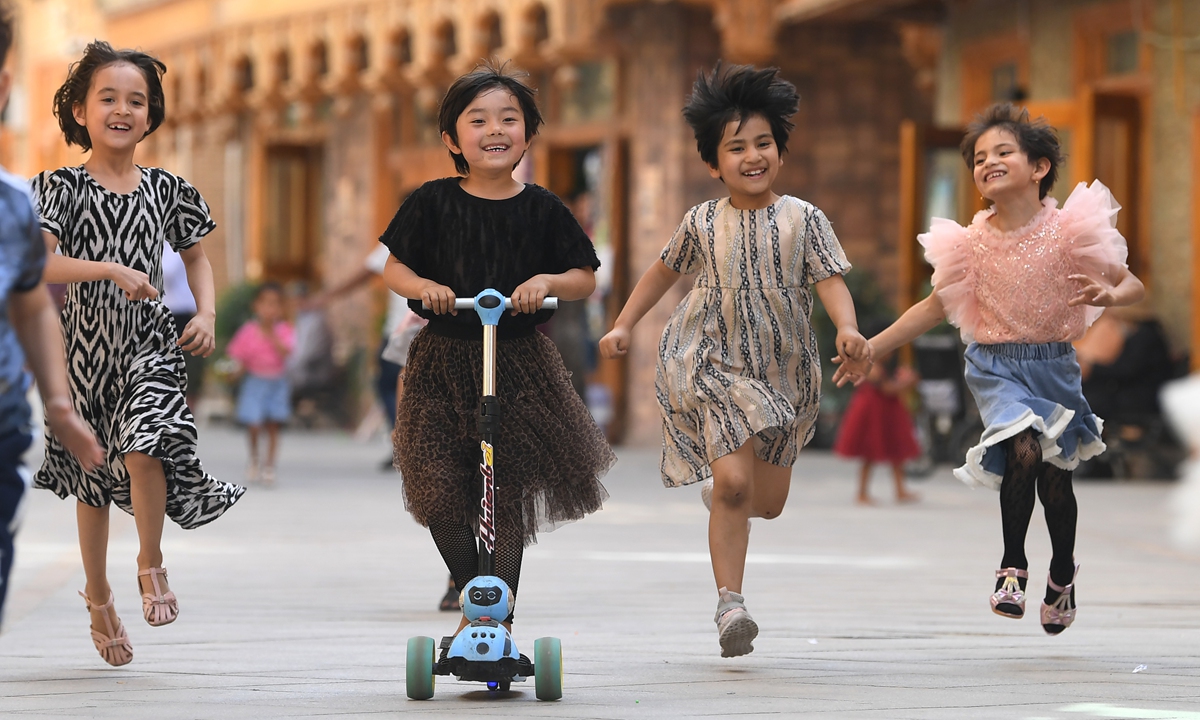
Local children play along Pigeon Lane in Tacheng in Northwest China’s Xinjiang Uygur Autonomous Region in May 2020. Photo: Xinhua
Western media also hyped related topics to fabricate “evidence” to portray China as an “executor” of genocide.
In August 2020, WUC released a statement on its website, claiming that 1 million Uygurs have been “detained” in “internment camps” where they have been subjected to “torture and other human rights violations.”
Then henceforth, words like “camp,” “internment camp,” “concentration camp,” and even “gulag” emerged in almost every report by the Western media on China’s Xinjiang region despite the Chinese government’s reiteration of there not being any such camps in Xinjiang. Xinjiang only had the vocational education and training centers as a de-radicalization measure.
The word “camp” has been chosen by the anti-China forces to not only conjure the horrific imagery of concentration camps run across Europe by Adolf Hitler’s Nazi forces and the resultant Holocaust but also as a ploy to demonize China. This was the first salvo that was to culminate in “genocide” accusation against China, Peng Qinxuan, an associate professor at Wuhan University Institute of International Law, told the Global Times.
Topics of “forced labor,” “birth control,” and “separating Uygur children from their families” have appeared in reports made by anti-China scholars, Western media, and US reports on human rights, but none have offered concrete evidence except for self-claimed victims’ stories.
For example, in September 2019, the HRW “called for” Xinjiang to “return minors” housed in state-run institutions to their families. Adrian Zenz and WUC as well as some Western media outlets including the New York Times also claimed, without evidence, that Xinjiang took Uygur children from their parents.
In response, Xinjiang officials repeatedly refuted such rumors. Parhati Rouzi, an official from Kashi Prefecture, told a press conference in January 2020 that “As Xinjiang is a vast region, there are a significant number of students who come from places far away from their schools, and therefore many of them choose to live on campus… It is up to students and their parents to decide whether or not to choose boarding education.”
Ironically, when some Western countries cannot find evidence supporting their claims of genocide against China, irrefutable proof of genocide on their own soil emerges. The latest such case was the remains of 215 indigenous children being discovered in a former residential school, the Kamloops Indian Residential School in British Columbia which is believed to have housed 500 indigenous Canadian children. At least 150,000 children attended such schools in what a historic 2015 Truth and Reconciliation Commission described as a “cultural genocide” targeting Canada’s indigenous people.
Evidence is crucial in the process of making a genocide judgment. Currently, there is not a shred of concrete or irrefutable “evidence” in the genocide accusations levied against China, most of which, it should be noted, has been provided by the WUC in the form of “testimonies” of people currently living unfettered lives in the West, Perry said.
“Despite satellites flying overhead, they’ve got no evidence from Xinjiang… Is this a ‘genocide’ – without a murder, without deaths, without crematoriums, without executions, without refugees, without a stream of people running away from Xinjiang seeking safety outside,” Perry said.
Aside from the glaring lack of evidence, those who attempt to charge China with “genocide” would face more difficulties on the systems of contentious jurisdiction in international law, Peng from the Wuhan University said.
According to Article IX of the UN Convention, disputes between the Contracting Parties relating to the interpretation, application, or fulfillment of the present Convention, including those relating to the responsibility of a State for genocide or for any of the other acts enumerated in article III, shall be submitted to the International Court of Justice at the request of any of the parties to the dispute.
China has reservations about this article. So if the US wants to bring “genocide” accusations against China’s Xinjiang to the international courts, it will face systematic problems as far as international law is concerned, Peng said.
West ‘greatest perpetrators of genocide in human history’
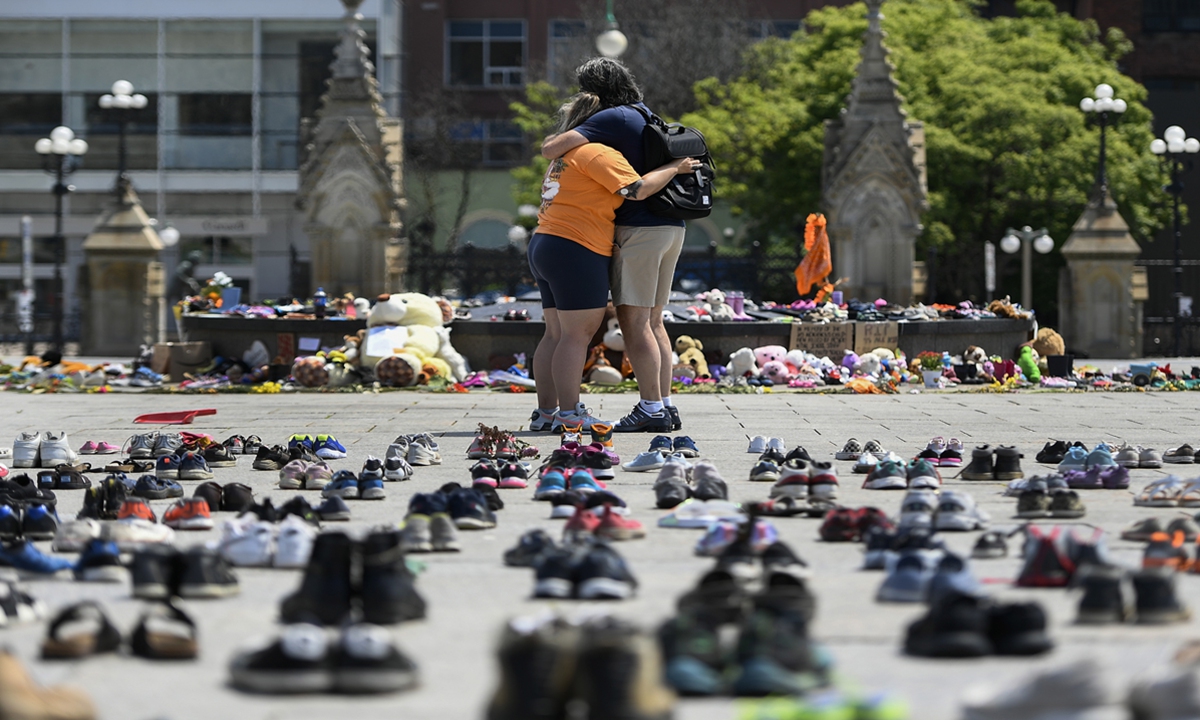
People pay tribute to the murdered indigenous children in Ottawa, Canada. Photo: Xinhua
To the Chinese, the term “genocide” is an altogether unfamiliar and alien concept – the intentional physical destruction of a people bound by a history, language, culture, and tradition, systematic, in whole, or in substantial part. This isn’t the Chinese way of interacting with people of different backgrounds, said Ren Yi, a graduate from Harvard University’s John F. Kennedy School of Government, who is an influential Chinese blogger with over a million followers on Weibo.
“Genocide is a very real concept to the European and Western ears: Because they are the greatest perpetrators of genocide in human history. What they are doing now is projecting their own sin onto and demonizing China in their own mindset,” said Ren.
The West developed racialized thought to its extreme and to this day, race-based hate crime is still a common and prevalent scene. The West constructed the concept of race and lives in the shadow of many of the most horrific crimes in human history. Hence the European civilization is really the “great architect and executioner of the very concept of genocide,” Ren said.
“Lies cannot be turned into facts even if they are repeated hundreds of times. The US’ launching of the campaign to accuse China of genocide only reflects the desperate struggle of the US in its global descent,” Peng said.
Hegemonic powers usually adopt double standards on issues pertaining to human rights – they cannot confront or erase their notorious history of racially fuelled massacres and genocides; and on the other hand, they exploit the topic to attack other countries for political gain, Peng said.
Recently, more global experts have stood out to express their opposition to the US and Western countries’ misuse of the term “genocide.”
“The charge of genocide should never be made lightly. Inappropriate use of the term may escalate geopolitical and military tensions and devalue the historical memory of genocides such as the Holocaust, thereby hindering the ability to prevent future genocides,” Jeffrey D. Sachs, director of the Center for Sustainable Development at Columbia University, and William Schabas, professor of law at Middlesex University, London, wrote in an article released by Project Syndicate in April.
In an article released on independent website Counterpunch, Alfred de Zayas, former United Nations independent expert, and Richard Falk, an Albert G. Milbank Professor Emeritus of International Law at Princeton University, also noted that the crime of “genocide” has been crassly instrumentalized to beat the drum of Sinophobia and the US has weaponized human rights as a countermeasure against China.
“The sudden flurry of United States interest in the fate of the Uyghur people seems less motivated by compassion or the protection of human rights than lifted from the most cynical pages of the Machiavellian playbook of geopolitics,” they wrote.
A massive march is held by First Nations in Toronto, Canada, on June 6 after remains of 215 indigenous children were discovered in Kamloops on the site of a former residential school. Photo: AFP

